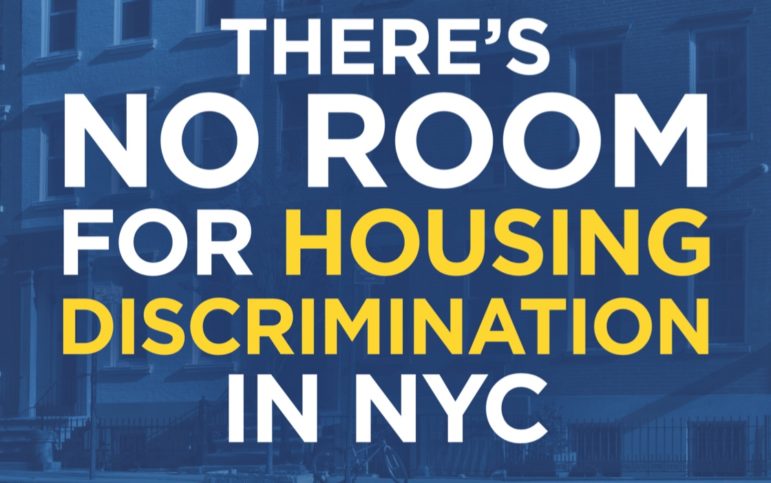
NYC Commission on Human Rights
A poster aimed at curbing housing discrimination.As the darkest days of the pandemic fade into memory, many New Yorkers are still coping with the hardships of the city’s exacerbated longtime housing crisis. For the past year, reports of record-high rents have dominated the news, raising questions about when these prices will decrease or plateau. Rent spikes are surpassing wage increases, and with all eviction bans lifted, evictions are rising across the city.
Despite working multiple jobs, many people are unable to find homes they can afford without supplemental income, in the form of rental assistance vouchers. And while city leaders have invested meaningfully in such programs, more action is needed to ensure that landlords accept vouchers as payment, which they are legally required to do. To help as many New Yorkers as possible find and keep stable homes, the city must urgently prioritize enforcement against housing discrimination and increase funding for the Source of Income unit at the New York City Commission on Human Rights (CCHR).
Rental assistance vouchers, such as the Section 8 Housing Choice Voucher Program or the Family Eviction Prevention Supplement (FHEPS), provide supplemental income to applicants who, whether due to eviction, domestic violence, disability, or safety issues, need housing. Not only are vouchers intended to help prospective tenants secure housing and move out of the shelter system, but they also give families greater choice in where they live, enabling them to move to lower-poverty, higher-opportunity neighborhoods that might otherwise be unaffordable. Research and practical experience, including housing mobility assistance programs, show that giving families greater choice in where they live positively transforms their lives.
But voucher holders continue to face routine ghosting and outright rejection by landlords and real estate brokers. In fact, bias against voucher holders is the most common form of housing discrimination in New York City. This is known as Source of Income (SOI) discrimination, which includes discriminating against potential tenants using vouchers, social security, and other forms of non-wage income to pay their rent.
Often a proxy for racial, disability or family status discrimination, SOI discrimination prevents voucher holders from accessing housing and undermines the strides that New York City has made investing in rental assistance. Thanks to the advocacy of the Statewide Source of Income Coalition, a coalition of fair housing organizations founded by ERASE Racism and currently led by Enterprise Community Partners, this form of bias was banned in New York City in 2010 and statewide in 2019. Since Source of Income is not a federally protected class, enforcing bans against SOI discrimination falls to city and state governments. But without robust local enforcement of these laws, discrimination against vulnerable New Yorkers continues unchecked.
The NYC Commission on Human Rights (CCHR) is primarily responsible for addressing local SOI complaints. The CCHR unit litigates on behalf of tenants, sues for damages, and negotiates settlements where probable cause of discrimination is found, which often leads directly to voucher holders being offered an application, an apartment viewing, or an apartment itself.
Unfortunately, years of budget cuts and city hiring freezes have rendered the commission less equipped to enforce SOI discrimination laws, with CCHR reportedly having no staff members in its SOI enforcement unit as recently as April. While CCHR is working to fill such vacancies, the agency must be empowered to offer competitive salaries, and to quickly hire, train, and deploy new staff to help New Yorkers with vouchers find housing. This will also help ease the strain on the city’s overcrowded shelter system, a situation which has only gotten more dire in recent months as thousands of asylum seekers are sent to the city from border states.
Raising awareness of CCHR as a resource is just as important, so that New Yorkers know that they can and should report SOI discrimination, which happens so often that many tenants assume it’s legal. While CCHR has begun this effort through public awareness campaigns, more visibility, particularly around what Source of Income discrimination is and how to report it, is needed. The city must increase promotional outreach around CCHR to ensure that New Yorkers are equipped to report SOI discrimination.
Community-based organizations (CBOs) across New York also work directly with tenants to help them access affordable housing. We urge the city to fund the work of these vital organizations, in addition to staffing up its public agencies.
Between skyrocketing rents and the pandemic’s lingering impacts, our elected leaders must ensure that city agencies and CBOs have the resources to help New Yorkers find and stay in their homes. Housing vouchers are an essential tool, but their effectiveness depends on preventing property owners from discriminating against New Yorkers who need them.
Without enforcement, laws are useless. For the sake of all New Yorkers, New York City must make SOI discrimination enforcement a priority—not just in its words, but with its actions.
Baaba Halm is vice president and New York market leader of Enterprise Community Partners. Amy Blumsack is director of organizing & policy at Neighbors Together.









2 thoughts on “Opinion: NYC Needs Better Enforcement Against Housing Discrimination”
No sane property owner will rent to any Section-8/nyc rent voucher tenants because they are the absolute worst of the worst. Trashed apartments, 3am visitors, frequent police responses. How is it even constitutional to force a property owner to take part in a voluntary program?
That’s wild to even say because NOT all section 8 holders are like that. I’m definitely NOT like that and I’ve had section 8 since 2007.
Maybe those are other programs but section 8 is literally makes no difference other than pay 70% of the rent for someone
The same person or people you’re referring could be CASH tenants doing the SAME nasty and messed up things. Being in a program doesn’t make you a savage or a “dirty person”